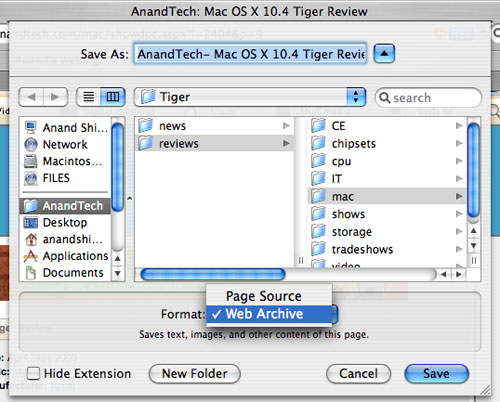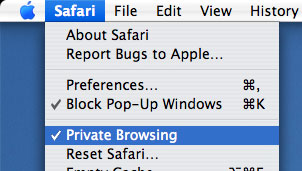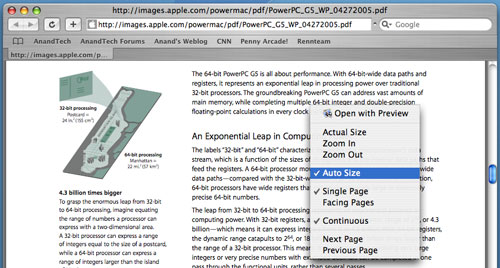Safari RSS (aka Safari 2)
In my first encounter with a Mac, I ragged on Safari for being a major disappointment under OS X; the browser looked great and was very user friendly, but it was sluggish and had a handful of annoying incompatibilities. With Tiger, Apple ships an updated version of Safari called Safari RSS.As its name implies, Safari RSS now allows you to read RSS feeds directly within the browser. Safari's integrated RSS reader is easy to read, well laid out, and works well within the Safari interface. I haven't really caught the RSS bug just yet, but Safari's implementation is quite nice. The only problem I have with it is that if a site offers more than one RSS feed, there's no way of accessing any but the first RSS feed listed in the site's code (Firefox will let you subscribe to any of multiple RSS feeds off of a single site without any problems).




Shortly before Tiger's official ship date, Apple released a brand new update of Safari for Panther users - Safari 1.3. Safari 1.3 (a part of OS X 10.3.9) offered some major improvements, mostly in the areas of performance and stability. The latest version of Safari finally solved the vast majority of my performance complaints about the browser, and as you would expect, Safari 1.3 under Panther performs quite similarly to Safari RSS under Tiger.
There are many cases now where Safari is actually faster than Firefox, but there are still some situations where Firefox is faster. What is most important is that Safari no longer feels like a slow browser, which greatly contributes to the subjective take on how fast modern day Macs happen to be - an area of weakness that can use any sort of improvement as is possible.
Safari's compatibility has come to bother me on a few occasions. Although, all of the sites that originally had Safari incompatibilities when I first started using the browser about a year ago have since been fixed. There still continue to be day-to-day incompatibilities with Safari; whenever I visit a website and things don't work exactly the way that I'd assume they would, I first have to open the page in Firefox to make sure it's not Safari causing the problems. This usually is a problem whenever I'm ordering something online or filling out any sort of form using Safari. If the submit button doesn't do anything or I get an error telling me that I didn't fill something out, yet I clearly did, then I know that I've been hit with another Safari incompatibility. For the most part, I'd say that Safari works fine on 100% of the sites that I read on a regular basis; however, it's the random sites or the times when I'm using sites that I rarely use that I sometimes encounter incompatibilities. They are annoying, but it's something that I've come to live with.
By far, the biggest problem with Safari that I've had is that the browser crashes, a lot, with certain web pages. Sometimes the crashing appears to be related to Flash; other times, it appears to be Javascript related and then there are other times when I can't even begin to pinpoint why it crashes. The problem seemed to have developed over time (possibly being made worse by subsequent OS X patches or just seeming that way by increased use of the browser), but it is definitely present on all systems. One thing that makes it difficult to diagnose is that I often have a large number of tabs open at once, and any one of those tabs could cause the instability. Needless to say, losing all open Safari tabs is a bit of a pain, and it's unfortunately something that hasn't been completely fixed in Safari RSS, but it does seem to have been somewhat addressed. I've only had a couple of crashes on the final version of Safari RSS and I've been using it a lot in preparation for this review.
I've mentioned in previous articles that I've always stuck with Safari because its look, feel and behavior matched what I'd expect from all other OS X applications. With Safari RSS, the decision to use Safari over something like Firefox or Camino (both of which I keep installed) is much less of a tradeoff. I only wish that Apple would add support for "find as you type" to Safari - it's the one feature that I truly do miss from Firefox.










55 Comments
View All Comments
melgross - Sunday, May 1, 2005 - link
#21 With all that you said, you didn't really say very much.Yes, it's true that Apple is mostly a hardware company. They will sell "only" a billion dollars of software this year.
But what you forget is that every Mac that sells takes away a sale of a copy of Windows from MS. Apple will sell more that a million more computers this year than they sold last year. That's over a million fewer copies of Windows sold. As well as less copies of windows software by MS and others. It also means more copies of MS Office for the Mac sold.
It's just dumb talking about "balls". This is a business. Maybe you like to play chicken, but companies that like to stay in business don't.
Perhaps if Apple licensed the Mac OS to MS both times when MS came knocking on their door life would have been different. :)
michael2k - Saturday, April 30, 2005 - link
#21: If anyone compares Longhorn to Tiger, it's because Microsoft has decided it's a valid comparison:http://insight.zdnet.co.uk/software/0,39020463,391...
Allchin has made public comments regarding Tiger, when talking about Longhorn.
On a technical level, Longhorn is implementing many of the features that Tiger, Panther, and Jaguar have, so comparison is unavoidable:
Avalon vs Quartz
Metro vs PDF
DB/WinFS vs Spotlight/HFS+
etc
Eug - Saturday, April 30, 2005 - link
#20: "So while Apple keeps braying to the moon about "Longhorn" I, on the other hand, am content to wait until Longhorn actually ships before making any sort of comparisons as I would prefer any comparisons that might be made to have some *meaning*...;)"Uh... I should point out that the Apple Mac OS X pages don't have a single reference to Longhorn anywhere, AFAIK.
Ocaid - Saturday, April 30, 2005 - link
The fact, "Jack", is that this is marketing and Apple does make nice hardware and a great OS for some people. And I do agree with some of your salient points. But for a company that "is not a direct competitor to MS", some of you guys sure seem to worry a lot about them.WaltC - Saturday, April 30, 2005 - link
I completely fail to understand this comparison with Longhorn...;) I mean, at one level I do understand it all too well--Apple PR, while completely ignoring Windows x64 as if it does not exist, enjoys boasting that it has "beaten" Longhorn out of the starting gate as a "64-bit" OS--but really this is just so very lame and completely transparent. Apple has always had an exquisite case of tunnel vision when it comes to picking and choosing what it will compare its products to...:DSo this whole "Longhorn-Tiger" comparison is so predictible and infantile (as Tiger is shipping and Longhorn isn't--so nobody has a clue as to what Longhorn will be when it actually does ship a year or two from now) and right on par for Apple PR. So typical of Apple to compare its products with products that aren't shipping--wow, how much "safer" can you can get than that? So while Apple keeps braying to the moon about "Longhorn" I, on the other hand, am content to wait until Longhorn actually ships before making any sort of comparisons as I would prefer any comparisons that might be made to have some *meaning*...;)
In this vein, I also wish that people would wake up and realize that Apple and Microsoft are not now direct competitors and never have been...;) Microsoft is software company--Apple is distinctly a hardware company--and the old saw in the industry is that the highest and best purpose for *any* Mac OS is that it serves as a dongle to protect and promote Apple's hardware sales.
The classic mistake that I see so often is this misunderstanding that Microsoft and Apple somehow compete in the same markets--not true. Apple's competitors in reality are companies like Dell, etc., who--unlike Microsoft--make better than 90% of their net income from hardware sales. It's pretty simple, really, as >98% of Microsoft's net income is from the sale of software exclusive of hardware. The difference is so vast I am surprised it is so often overlooked. And yet it is...
For instance, if Apple would decide to undertake to write an OS for the same x86 hardware standards that Microsoft does (Intel/AMD promulgated standards, mainly) *then* we could call them competitors with a straight face since they'd be competing for share in the same hardware markets. But the simple fact is that Microsoft doesn't even *make* the computers which run its OS's (and so of course cannot and does not profit directly from such hardware sales); but an Apple OS, on the other hand, is totally useless in the absence of an Apple designed-and-sold computer to run it. The enormous differences ought to be clear as daylight to everyone.
Basically, the concept that an Apple OS is any sort of direct competition to a Microsoft OS is purely a wishful and irresponsible--not to mention inaccurate--fantasy. That's why talking about Apple's <3% share of the annual world-wide *desktop* computer market (which is far, far less in the exclusive server markets, or higher in the notebook markets, etc.)is somewhat of a bogus comparison in the first place. MS OS's serve "everybody else" apart from Microsoft (eg, Dell and the thousands of other companies manufacturing x86 PCs and components exclusive of Microsoft) while Apple's OS's serve only Apple-branded hardware exclusively. I am always surprised as to why this salient fact of the matter is so often ignored. But there it is...
I'd love to see Apple competing directly with Microsoft in the much larger hardware arena of x86 platforms and standards--I would welcome the competition. But I honestly don't think Apple can compete in that market--and I believe that's exactly why Apple doesn't even try. I'd love to see Apple offer its own Apple-branded x86 PCs along with an Apple x86 OS which would run on "everybody else's" x86 box just as Microsoft's OS's currently do--but I'll tell you right now that I'm not going to hold my breath waiting on that to happen as I don't believe it ever will. Frankly, I don't believe Apple has either the balls or the brains or the will to do it--and that's the fact, Jack...:D
michael2k - Saturday, April 30, 2005 - link
#11: Obviously the article is not meant for you then. Does it occur to you that there are other reasons to use computers than play games? Video games are not the end all and be all of the computing experience.HansZarkow - Saturday, April 30, 2005 - link
Repeatedly reading about how buggy Tiger is makes me wonder, why Apple pushed the release. Panther was doing alright and Apple is generally rather thorough when it comes to that.I think Tiger was originally to be released in 2H05 around the same time that Longhorn was scheduled. Then Microsoft pushed the release date back a year. Now Apple faced the situation that they couldn't release 10.5 only a year after 10.4.
So not only wouldn't they be able to react to some features that Longhorn might bring along, but they would also leave Microsoft an undistored PR-window where they would be mere spectators.
Hence, Apple rushed the Tiger-release to 1H05, approximately 18 months after Panther. That gives them another 18 months to fine-tune 10.4 and come up with an answer to every feature that Longhorn might pack.
It's the price of being Apple, the (self-proclaimed) technology-leader, they can't let Microsoft talk about the (possible) advantages of Longhorn for half a year.
This makes sense from a PR point-of-view, but it is definetly unfair to the people buying 10.4 because I doubt it will see its full potential before 10.4.3
vailr - Saturday, April 30, 2005 - link
#13: Not correct! My 3.2 GHz P4/WinXP machine can run PearPC/MacOSX 10.3.9, with "About this Mac" info indicating that it's a "Mac G3 running at 1.32 GHz".So, would be interested to see whether: WinXP64/PearPC/MacOSX 10.4, running on an "upper echelon" AMD64 chip could compete, speedwise, with OSX Tiger, running on native Mac hardware?
jasonsRX7 - Saturday, April 30, 2005 - link
I don't know if it's just because I'm more used to it, but I still like Quicksilver better than Spotlight. I find QS to be faster and more functional. Maybe Spotlight just needs to grow on me some more.DerekWilson - Saturday, April 30, 2005 - link
#15 ... is that a joke (and coincedence) or an attempt to bring up the legal suit being brought against Apple by Tiger Direct for the use of the Tiger name?Haven't kept up with that much myself -- though it did seem fishy that they waited until this week to bring up the issue.
http://apple.slashdot.org/article.pl?sid=05/04/28/...